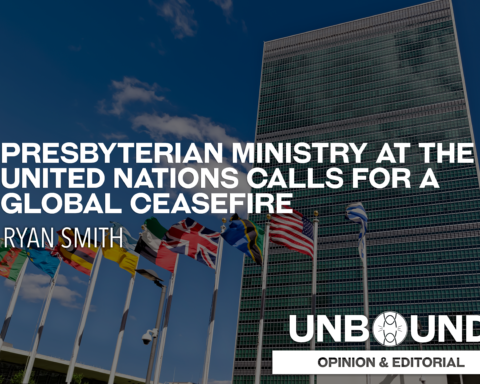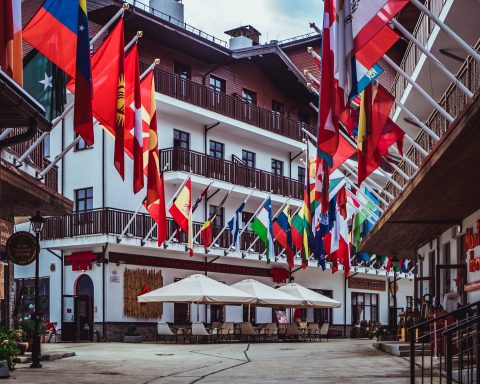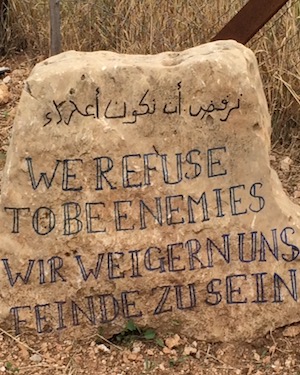
With regard to foreign policy, the real dragon facing the United States is not China but the grandiosity of its own leaders, as seen in recent speeches by President Trump and National Security Advisor John Bolton. Despite the phrase “principled realism,” the President’s speech was a mixture of boasts and threats that could not conceal the corrosive effects of his administration’s go-it-alone actions. Rather than build on the rock of trust built up with allies over time, the President celebrated military spending and trade wars built on the sand of excessive debt.
The world leaders in the United Nations hall laughed at the President’s bombast, well aware that the stimulus of that deficit spending has only juiced the already-wealthy parts of a grossly unequal US society. But it is the invocation of “sovereignty” that most reveals the dangerous idolatry in nationalism, reminding us of the moral institutions that generations of primarily Protestant Christian Americans built, precisely to make us better than a brutal leviathan thrashing about in a world of greed and fear. To a minister in the President’s former church, it is “the fear of God that is the beginning of wisdom;” the loss of this sense of God’s awesome presence undergirding all moral law empties the President’s America of moral purpose, flawed as our performance has sometimes been.
___________________________________________
People have sometimes denied that human equality is a basic setting on the moral compass, but our tradition also claims that continuing reformation—and repentance—are necessary for fully human flourishing.
___________________________________________

The President betrays not only all those nations with whom we have joined in treaties now broken, but his administration betrays the actual principles of his own heritage. The Reformed Protestant tradition emphasizes God’s sovereign moral claim over all aspects of life, with the humbling recognition that sin infects every human enterprise. All people with power will overreach; thus, all powers need balancing and legal accountability. At the same time, everyone has a vocation to contribute to the common good—whatever their degree or kind of power. The individual rights we celebrate go back to the mutual obligations of a covenant with God, who gives us dignity and freedom intertwined with a responsibility to care for others. People have sometimes denied that human equality is a basic setting on the moral compass, but our tradition also claims that continuing reformation—and repentance—are necessary for fully human flourishing.
Reinhold Niebuhr, the best known 20th Century ethicist operating largely within the Reformed tradition, exposed the blinding dynamics of self-interest especially prevalent in moralistic nations, and constantly warned against our acting as an empire. Niebuhr and countless other mainline Protestants pushed hard for the creation of a United Nations and celebrated the Universal Declaration of Human Rights, which reflects much Christian influence. Every mainline Protestant Church in America was influenced by Niebuhr’s Christian Realism from the 1930’s to the 1960’s, and then—with him—those largely white churches gave growing support to the Civil Rights movement that claimed full equality. Adding “under God” to the Pledge of Allegiance in 1954 may have been an act of “civil religion,” but to the extent it is believed, it is a claim that God is sovereign and that we must all “take a knee” when anyone is oppressed by us. The phrase certainly does not justify self-righteous nationalism.
During the Cold War, the churches did not forget the moral learnings from the Holocaust and fascism. Their work for disarmament and restriction of the military-industrial complex reflected clear Christian teachings. Mainline churches resisted the political Manicheanism of demonizing our Soviet and Maoist adversaries and seeing ourselves as entirely good. While we are aware of continuing, often unconscious structural racism, the mainline churches supported decolonization and welcomed “Third World” Christian witness as the fulfillment of the 19th Century missionary movement. The Peace Corps, though seen by some as a “soft power” strategy, also carries on some of the unselfish aspirations of many earlier educational and medical mission co-workers. Similarly, many children of missionaries served in the State Department, seeking to build international friendship. They, and countless other Christians, found it possible to love more than one country at once.
___________________________________________
US independence and self-government are not threatened by international law, treaties, or their vehicles in the UN or international institutions. Those outside bodies are, however, convenient scapegoats for a domestic political process corrupted by unaccountable money.
___________________________________________
The mainline Protestant churches’ moral vision of a more cooperative world has been split by some of the same moral struggles that have faced the country as a whole. Can we do “business as usual” with an apartheid regime in South Africa, or with a dictatorship known for torture in Latin America? The churches responded by leading in the development of the corporate social responsibility movement, putting their investments where their mouths were, using shareholder proposals and the nonviolent solidarity methods of boycott, of divestment, and of other bottom-up economic sanctions. Increasingly, mainline Christians are finding Israel’s long denial of citizenship rights for the Palestinians to be unjustifiable on security grounds and incompatible with the Judaism they have respected in the US. And just as the mainline denominations opposed the Iraq war from before the neo-conservatives started it, they oppose re-demonizing Iran and breaking the multilateral nuclear agreement.
Behind the words “America First,” many Protestant mainliners do not see greatness but a desire to shake off moral obligations to refugees and asylum-seekers. Anti-immigrant feeling is not only motivated by racism, but it is hard to explain the separation of children as anything but racism in action. Meanwhile the attacks on “globalism” and the International Criminal Court, are transparent admissions of guilt for the de-stabilizing climate change we still fuel and the human rights violations our forces have committed or supported. Those Central Americans risking so much to enter the US—are they not fleeing corruption and militarization partly funded by our own “war on drugs?”
___________________________________________
Whenever sovereignty is used to claim immunity from moral law, or to spread untruths, we have the recipe for a corrupt rogue state.
___________________________________________
US independence and self-government are not threatened by international law, treaties, or their vehicles in the UN or international institutions. Those outside bodies are, however, convenient scapegoats for a domestic political process corrupted by unaccountable money. If the UN is corrupted by anything, it is above all by the individual veto power given to permanent Security Council members. The Reformed Protestant tradition values good government as God’s agent and distrusts anyone with too much power, whether it is a pope, king, CEO, or president. That veto given permanently to five nations consistently undercuts the aspirations of others and the imperatives of cooperation among all.
Our own self-government is at risk, too, as it requires maximum civic participation and the unhampered flow of factual information. But this risk is largely internal—we are far more endangered by US politicians’ lies than by Russian trolls. Whenever sovereignty is used to claim immunity from moral law, or to spread untruths, we have the recipe for a corrupt rogue state. In such cases, self-government is replaced with government by an imperial self, and all institutions of the common good are looted or demeaned in favor of the interests of empire.
___________________________________________
Being “first” or “most powerful” simply does not contribute to national or global sustainability or to actual freedom, all of which rest on the free expression of truth.
___________________________________________
This danger has been amplified because the US has been in a fear-driven state of war since 9/11/01, bringing us to a crisis of national purpose. The military itself has wisely resisted being totally partisan, but the various endless, “zombie” wars and undeclared covert interventions create a state of “moral injury” for sincere soldiers and contractors. Fear of terrorism or gun violence, affirmed by every airport screening, distracts from the obvious messages of extreme weather and failing infrastructure. Being “first” or “most powerful” simply does not contribute to national or global sustainability or to actual freedom, all of which rest on the free expression of truth. Far better to remember Jesus’ words, “whoever would be great among you must be your servant, and whoever would be first among you must be the slave of all” (Mark 10: 43-44).
The alternative text, which may unite Protestants, Catholics, and perhaps everyone of good will, comes from St. Augustine: “Without justice, what are kingdoms but great robberies?”
That kind of greatness we do not need.
***
Author Bio: General Editor Chris Iosso has been ordained (Elizabeth Presbytery in NJ), inducted into General Assembly Mission Council service in NYC, and educated (Johns Hopkins—BA, Princeton—MDiv, and Union (NY)—PhD, Seminaries) in the print dispensation. After serving as a pastor and parent of three in Westchester County, NY, he returned to the PMA as Coordinator of the Advisory Committee for Social Witness Policy. He is married to chaplain Robin Hogle.
Read more from this issue, Make America Just. Period. (A Moral Platform for the Christian “Justice Voter”).






Unbound Social